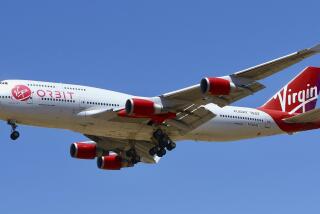McDonnell Unit Gets Piece of Lucrative Rocket Program
- Share via
McDonnell Douglas Astronautics Co. in Huntington Beach and Martin Marietta Corp. in Denver will team up to help design the next generation of space booster rockets as winners of one of three Air Force contracts announced Tuesday.
General Dynamics Corp. in San Diego and Boeing Aerospace Co. in Seattle were chosen for the other two contracts.
The awarding of three contracts came as a surprise. Air Force officials had said last June that they expected to select only two finalists in the competition to design a so-called advanced launch system (ALS).
At that time, the Air Force said the two winning contractors would receive about $100 million each. The value of each of the three contracts announced Tuesday was not disclosed, and an Air Force spokesman said individual contract values would not be determined until later.
With Existing Staff
McDonnell Douglas spokeswoman Sheila Carter said Tuesday that most of the work on the ALS program under its joint contract with Martin Marietta will be performed at the latter’s facility in Denver, although some of the work will take place in Huntington Beach.
“We don’t expect to hire too many more people,” Carter said. “We can do the work with the existing staff we have.” The three contractors were chosen from an original group of seven companies bidding to develop and, eventually, build a family of unmanned rockets that will be highly reliable and could haul much heavier loads at much lower cost than do current boosters.
The Air Force says such rockets are needed if the nation plans to launch the “Star Wars” missile defense system or hopes to lift large military or commercial satellites into orbit or carry out a manned mission to Mars someday.
Under the contracts announced Tuesday, the McDonnell Douglas-Martin Marietta team and Boeing and General Dynamics will each design and build prototypes of the rocket systems. In 1990 or 1991, the Air Force expects to select one of the firms for a contract to actually build the rocket system, which would be ready by the end of the 1990s.
Competition among the bidders has been fierce because of the large financial stakes involved. The Pentagon has estimated that the system will cost $17 billion to build.
“We have begun the narrowing process to build the next generation family of launch vehicles,” Air Force Secretary Edward C. (Pete) Aldridge said in a statement. “The ALS technology effort will provide this country with booster systems that will carry us into the 21st Century.”
More to Read
Inside the business of entertainment
The Wide Shot brings you news, analysis and insights on everything from streaming wars to production — and what it all means for the future.
You may occasionally receive promotional content from the Los Angeles Times.










